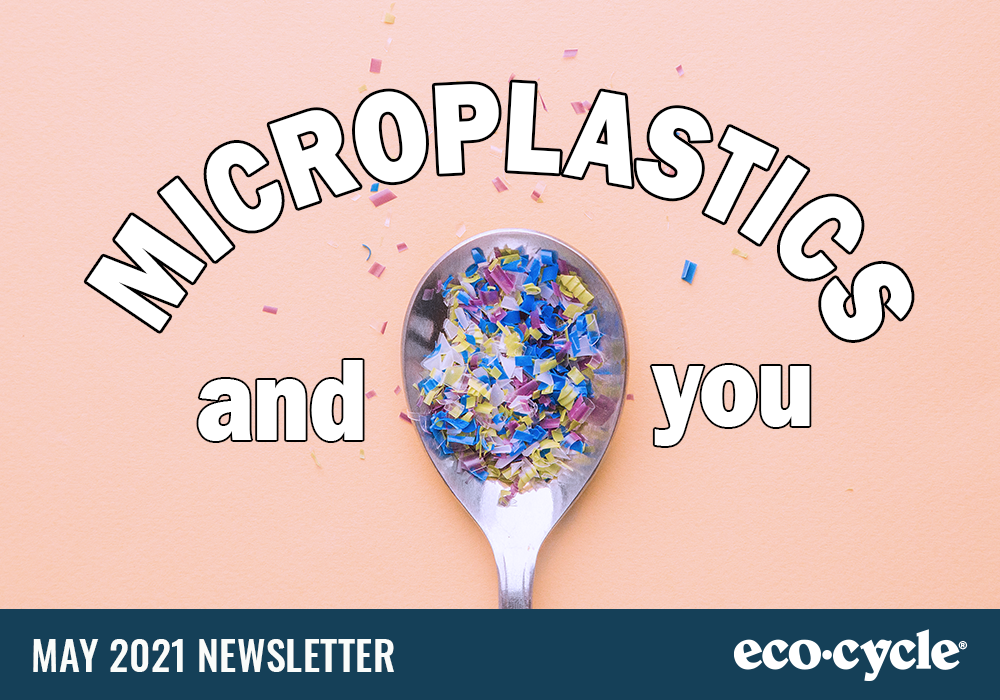 | | | Microplastics and You One of the most visible signs of human impact on the environment is plastic pollution. We have all seen countless pictures of plastic bottles, straws, and containers littering shorelines and the ocean, but those noticeable plastics hide a more insidious problem: microplastics. Microplastics are an invisible threat to ecosystem and human health. Smaller than a sesame seed, microplastics have been found everywhere scientists have searched for them, from the highest peaks of the Rocky Mountains to the deepest parts of our oceans. They have also been found in the food we consume, including our table salt and sea food. The prevalence of microplastics in our food, water, and environment has resulted in an accumulation of these plastic particles in human tissue. Most recently, microplastics have even been found in the placentas of pregnant women! Microplastics can come from many sources. They are split into two categories: primary microplastics — like microbeads in cosmetics — and secondary microplastics, which are formed by the breakdown of larger plastics. There has been some progress in the elimination of primary microplastic pollution through regulation and awareness, but secondary microplastics are a much larger issue, and harder to regulate. These microplastics can be formed from a plastic bag breaking down in a lake or ocean, a plastic-coated paper coffee cup decomposing in your compost, or even fibers generated when washing synthetic clothing! | |  | | | Fortunately, there are easy ways that YOU can help decrease the amount of microplastic pollution in the environment! - Make sure that you keep plastic-coated paper products out of the compost bin! Items such as plastic-coated paper coffee cups and paper plates, to-go containers, and ice cream cartons contaminate the compost process, resulting in microplastics in compost that is often used to grow food. Use durable cups, plates, and utensils, or look for items that are BPI certified compostable instead. Always remember: "When in doubt, throw it out!" For guidelines on what is compostable in Boulder County, check out our “Is it Compostable?” guide.
- So much clothing today is made of synthetic material that can leach microplastic fibers into water systems when laundered. Help fight microplastic contamination of water supplies by purchasing a microplastic filter for your washing machine! Adding a filter can reduce the amount of microplastic fibers that wash away from your synthetic clothing. There are two ‘styles’ depending on your needs: A filter that attaches to the outflow of your machine (the most effective) but does require some installation and light plumbing work, or a filter bag that you can use inside your machine. To use a filter bag, place your synthetic clothes inside the bag and the microfibers will collect inside the seams of the bag as your clothes are being washed. This option requires no installation but is slightly less effective. Here are several options and places to purchase these products:
Outflow Filters:
Fitrol Filter: $ 139.99
The Lint LUV-R: $ 180.00
Girlfriend Collective Microfiber Filter: $ 45
PlanetCare Microfiber Filter: $114.32 Filter Bag:
Guppyfriend Washing Bag: $34.95
Eco-Cycle has been a national leader in the effort to keep microplastics out of compost. See our research findings at: https://www.ecocycle.org/specialreports/microplasticsincompost.Together we can have a significant impact on reducing microplastic pollution! Article by Brittany Nicolaysen, Master Environmental Educator/Microplastics and Special Projects Coordinator, Eco-Cycle. Contact Brittany at brittany@ecocycle.org. | | | |  | Eco-Cycle and Partners Launch Alliance for Mission-Based Recyclers (AMBR) to Advance Systemic Recycling Industry Improvement Four of the original pioneers of mission-driven, community-based nonprofit recycling in the United States have joined in coalition to launch AMBR, the Alliance of Mission-Based Recyclers. AMBR is working to guide campaigns, policies, and infrastructure investments to advance credible, transparent, recycling systems that serve as a bridge toward a circular economy and just, resilient, local communities. AMBR’s founding members are Boulder, CO’s Eco-Cycle; Berkeley, CA’s Ecology Center; Minneapolis, MN’s Eureka Recycling; and Ann Arbor, MI’s Recycle Ann Arbor. Individually, they operate some of the longest running programs in the nation founded on environmental, community development, and social justice missions. AMBR members also share a Zero Waste advocacy lens, and environmental and social justice missions. AMBR’s current first priority is to stem the tide of single-use plastic packaging waste. By reducing consumption and by raising manufacturing and recycling industry standards for the most problematic and unnecessary plastics, AMBR wants to flip the common idea that recycling needs to be “fixed'' to accept all plastics. Instead, plastic packaging needs to be standardized, reduced, and redesigned. | | | | | | | | | | Eco-Cycle
PO Box 19006 | Boulder, Colorado 80308
(303) 444-6634 | recycle@ecocycle.org | | | | | | | |